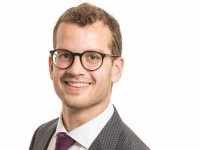Incoming Double Tarheel Shares Pandemic Preparation in Laos
July 14, 2020
Gillings School of Global Public Health

Samuel Haddad '18
Samuel Haddad, BSPH, a 2018 UNC Gillings Global School of Public Health nutrition alumnus, was already working in Laos (the Lao People’s Democratic Republic [PDR]) to prepare for a public health emergency when COVID-19 began spreading on a global scale. With the support of a Princeton in Asia Fellowship, the Morehead-Cain scholar had travelled to Vientiane Laos weeks after graduating to work with Population Services International (PSI) – which was founded in 1970 by Gillings School alumni Phil Harvey, MPH, and Timothy Black, MPH – to reinforce the country’s public health emergency operations center (PHEOC). There, Haddad contributed to efforts to eliminate malaria, which laid the groundwork for the country’s rapid shift to a pandemic response.
The 2013 Ebola pandemic taught many the tragic reality of unforeseen pandemics, including Microsoft co-founder Bill Gates, who warned in a 2015 Technology Environment and Design talk that the world was not ready for another global pandemic. The Bill & Melinda Gates Foundation funded projects to strengthen emergency operations centers in several countries to prepare for and respond to such public health threats, and the first malaria-specific grant went to PSI and partners – the Lao Ministry of Health’s Department of Communicable Disease Control, the World Health Organization Lao PDR Country Office and the Clinton Health Access Initiative. Working with this coalition, Haddad helped set up the project to strengthen Laos’s PHEOC; it bolstered frameworks, processes and a database to track contagious diseases, such as malaria, and increased the country’s ability to respond to public health emergencies.
These infrastructural improvements proved vital in preparing the country to address the COVID-19 pandemic. When the disease began spreading in China in early January 2020, the PHEOC responded by taking stock of equipment necessary to treat it and informing public officials of deficiencies. The PHEOC also implemented a system to monitor the pandemic and response, coordinating with the Ministry of Health and disseminating information about procedures and protocols to the provinces.
Haddad and the PHEOC learned from the challenges associated with this communication effort.
“With COVID-19, there were so many unknowns that made risk communication very difficult,” he said. “Regional differences in Laos also made it hard to communicate standard operating procedures and clinical protocols from the central level to other provinces in the north or the south in a timely manner. It takes a lot of time for everyone to get trained and up to speed with protocols effectively rolled out.”
Haddad also noted that disinformation on social media hampered efforts to keep the public informed. The PHEOC established a hotline staffed by medical students who shared the latest information on the pandemic with the public, but the hotline was quickly overwhelmed with 3,000–4,000 daily calls. This experience underscored the importance of maintaining a trusted information channel.
As a result of support to the PHEOC, Laos had access to the national health management information system, including COVID-19 tests and results, and was prepared to act based on real-time data updates, closing borders and nonessential businesses, banning travel between provinces and enacting social distancing. Owing in part to these efforts, Laos had fewer than 20 cases as of June 3.
“The country can finally take a breath and regroup to prepare for what comes next,” said Haddad. “There’s a focus on the new sets of risks associated with reopening the country’s borders and resuming international flights.”
He contrasted the situation in Laos to the one he encountered when returning to the United States.
“Now that I’m back in Texas, hardly anyone is wearing masks in my city, which has had over 3,000 cases in a population of around 200,000,” he said.
Haddad was committed to stay and finish his work in Laos, even after the fellowship program withdrew support as a result of the pandemic. However, with borders closing, numbers of flights dwindling and friends leaving, Haddad had to take a U.S. Department of State repatriation flight, which returned him to Texas in early April 2020. It may have been his last chance to return home in time to start a combined Master of Public Health and Doctor of Medicine program at UNC.
The partnership’s collaborative approach to the COVID-19 response in Laos, meanwhile, has served as a model for similar PHEOC projects in neighboring countries Cambodia and Myanmar.
